Guide to Taxes as an Independent Contractor

There are definitely some perks to being an independent contractor in the construction or real estate industry. You can choose what projects you take on and what clients you work with. You also have freedom when it comes to how you go about completing a project. But with that freedom comes some responsibilities, particularly when it comes to your taxes.
If you worked with a company as an employee, that company would be responsible for withholding taxes from your paycheck. As an independent contractor, no one is withholding taxes for you. It’s up to you to make sure you pay what you owe on the right schedule. Whether you’re new to being self-employed or could use a refresher when it comes to your tax obligations, read through our tax tips for independent contractors to learn more about what you can and should do to ensure you don’t get penalized.
What Is an Independent Contractor?
An independent contractor is an individual who provides a service or trade to the public. If you are an independent contractor, your clients might be other individuals, such as people who are looking to hire a company to build their home, or other businesses, such as contractors or developers who need someone to complete a portion of a project for them.
There can be some confusion over who’s an independent contractor and who’s an employee of a company. The Internal Revenue Service (IRS) has specific rules that help to determine whether someone qualifies as an independent contractor or an employee of a business. These federal income tax rules focus on three distinct areas:
- Behavioral
- Financial
- Relationship
When you’re an independent contractor, the business or individual you work with has little control over your behavior. They can’t tell you to show up to start work at 7 a.m. or to end your workday at 5 p.m. They also can’t tell you where to do the work, what tools you can use to complete a job or how to approach a project.
Another part of the behavioral rule focuses on the type of instructions a business or individual can give you as an independent contractor. If you’re not an employee, a company can’t tell you exactly how to perform a task or give you step-by-step instructions. Usually, independent contractors don’t receive training from the business or individual they are working with. There’s the expectation and assumption that you’ll already be experienced and will know exactly what you need to do to complete a project.
Businesses and individuals who hire independent contractors also have little financial control over the contractors. One factor that can help identify an independent contractor versus an employee is the amount of money you’ve invested in your work. If you’ve purchased a lot of equipment or if there’s the expectation that you’ll bring your own tools to the job, you’re most likely an independent contractor.

How the company you’re working with pays you also helps to determine whether you’re an independent contractor or not. Usually, as an independent contractor, you set your own rates and fees. You might charge a client a flat fee for a project or charge them a day rate. Your fee might include the cost of materials or that might be a separate expense for your client.
Employees of a company typically get paid by the hour or on a salary basis. Although they can negotiate with their employers when it comes to the amount they earn, they don’t have full control over the price of the project or the wage they receive.
Your relationship with the entities or people you work with also determines whether you’re an independent contractor or an employee. Usually, independent contractors don’t receive benefits, like retirement or health insurance, from the clients they work with. Employees typically do.
How long you expect the relationship to last also varies based on whether you’re an employee or an independent contractor. Typically, when a company hires an employee, there’s the expectation that the employee will continue to work for the company for the long term, even after a project ends. Independent contractors might not continue to work with clients once the project is over. If they do continue to work with the same client, it might be under different terms and for a different pay rate.
Although independent contractors are business owners, not everyone who owns a business is an independent contractor. As an independent contractor, the person or entity that hired you and is paying you has final say over the results of your work. While they can’t tell you how to do the job, if they aren’t happy with the finished product, they can ask you to try to fix it or refuse to pay you.
How Does Being an Independent Contractor Affect Your Pay?
Being an independent contractor affects your pay in a few ways. When someone is an employee of a company, they can typically expect to get paid on a regular schedule. Every month, every two weeks or every week, employees receive a paycheck. The amount of the paycheck might be the same each pay period if they earn a salary or it might vary if they get paid hourly and work a different number of hours each period.
As an independent contractor, you don’t receive regular paychecks. When you get paid can fluctuate based on the number of projects you have at a given time, the pay schedules you’ve set up and how timely your clients are with their payments. Often, you need to send invoices to clients before they will pay you for a project.
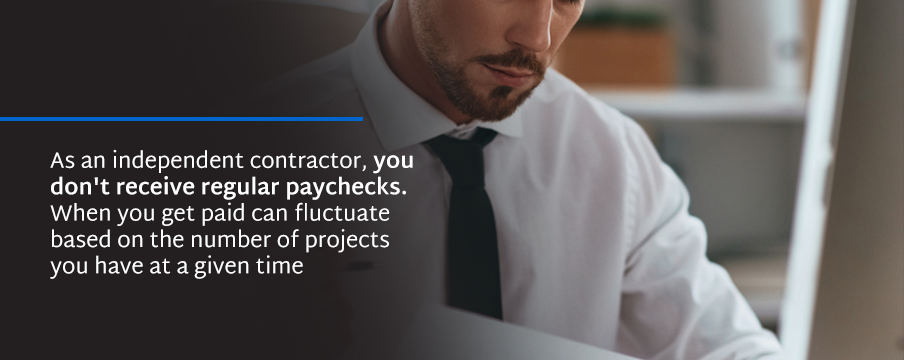
Depending on how you structure things, you might ask clients for payments at the start of the project and at certain points along the way. You might also decide to let people pay once the project is finished. There’s a lot more uncertainty when it comes to getting paid as an independent contractor, including the possibility that a client might go missing and never pay you at all.
Another way that being an independent contractor affects your pay is in terms of the amount you receive from clients. An employer is responsible for taking taxes out of your paycheck. The appropriate amount of tax goes to the local, state and federal government before you get paid. Your employer also takes out Social Security and Medicare taxes and might deduct your contribution to a retirement account and the payment for your employer-sponsored health insurance.
When you get your paycheck as an employee, the money is all yours. You can spend it, save it or do whatever you want with it.
When a client pays you as an independent contractor, the amount of the payment is likely to be bigger than the amount an employee receives. But you most likely don’t get to keep all of the money in the check. Clients don’t withhold taxes for independent contractors. The size of your paycheck can be deceptive, as you’re responsible for setting aside money for your local, state and federal taxes, as well as for self-employment taxes. If you are saving for retirement or paying for health insurance, you’ll need to make sure your payments are sufficient to cover those costs, too.
How Does an Independent Contractor Pay Taxes?
As an independent contractor, you have to pay taxes, like everyone else. The process for paying taxes as an independent contractor is a little more complicated compared to the average employee. Since no one is withholding taxes for you, you need to make the payments yourself, usually in the form of estimated tax payments. Additionally, some cities or municipalities treat independent contractors like businesses and expect them to have business licenses and to pay business taxes, which might be different from the taxes employees pay to the same city or municipality.
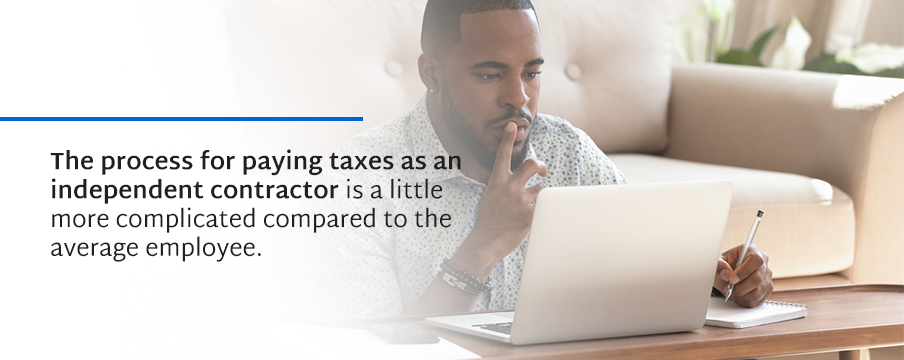
Federal estimated tax payments are due four times a year, on:
- April 15
- July 15
- September 15
- January 15
The exact date payments are due can vary slightly from year to year. For example, if the 15th falls on a weekend, your estimated tax payment would generally be due on the next business day.
For each quarter, you need to pay tax on the money you received in the preceding months. For example, if you earned income before April 1 of the year, you need to pay tax on it by April 15. If you start working as an independent contractor over the summer and get your first payment after August 31, your estimated tax is due by January 15.
There are several ways you can pay your estimated taxes to the IRS. One option is to send in a voucher from Form 1040-ES and a check. Another option is to have the money directly deducted from your bank account or to pay by credit card. If you were going to receive a tax refund for the previous year, you can choose to have the amount you overpaid credited to your tax for the year to come.
It’s important to note that your estimated taxes are just that — an estimate. The IRS and your state and local governments, if applicable, aren’t expecting you to pay them the exact amount you’ll owe for the year.
To make sure that you’re not under- or overpaying your taxes, you’ll need to file a tax return at the end of the year. The tax forms you need to include with your return are slightly different for an independent contractor than they are for employees. You also have more deductions as a self-employed person than a traditional employee does.
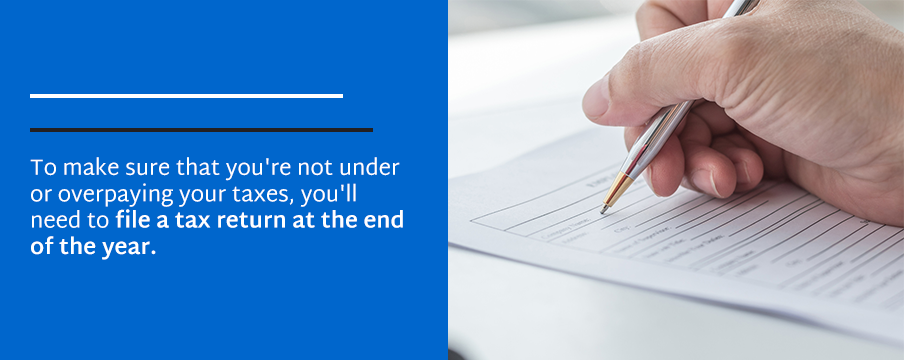
Does an Independent Contractor Have to Pay Estimated Taxes?
Do you have to make estimated tax payments as an independent contractor or can you wait to pay your taxes until you file your return? The short answer is yes, you need to make estimated payments. The IRS expects you pay estimated taxes if you’re going to owe at least $1,000 and if the amount of tax credits or withholdings is less than 90% of your tax for the current year or 100% of the tax you paid in the previous year.
There are some instances when you might not have to pay estimated tax as an independent contractor. If you are an employee of a company and do construction projects as an independent contractor as a side hustle, you might have your employer withhold enough tax from your paycheck to cover the amount you would need to pay in estimated taxes. You can also have your spouse’s employer withhold enough tax from their paycheck to cover your tax obligations as an independent contractor if you file a joint return. If it’s your first year working as an independent contractor and you have no tax liability for the previous year, you might not be responsible for estimated tax payments.
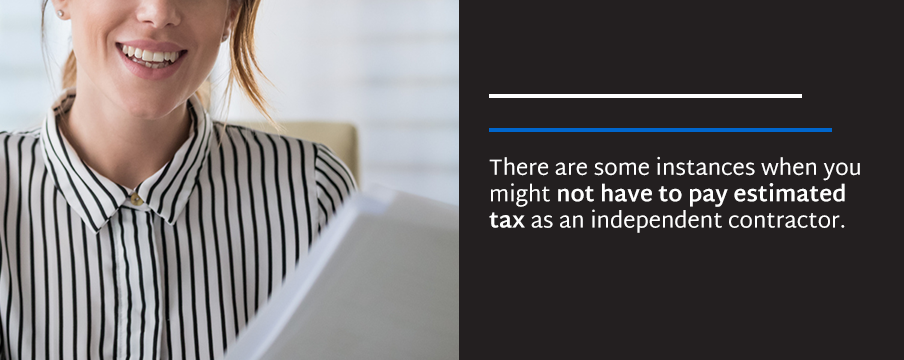
What Taxes Do You Have to Pay as an Independent Contractor?
Independent contractors pay more taxes than a standard employee since they are both employee and employer.
As an employee, independent contractors have to pay taxes on the amount of income they earn during the year, minus any deductions from that income. The U.S. uses a progressive tax system, which means that the rate you pay is based on your income. The higher your income, the higher your tax rate. As of 2019, the tax rates for a single filer are:
- 10% for income under $9,700
- 12% for income between $9,700 and $39,475
- 22% for income between $39,475 and $84,200
- 24% for income between $84,200 and $160,725
- 32% for income between $160,725 and 204,100
- 35% for income between $204,100 and 510,300
- 37% for income more than $510,300
It’s worth noting that the tax rate applies to each section of income, not to the entire amount you earn. For example, if you brought in $550,000 as an independent contractor, you’d only pay the 37% rate on the amount above $510,300, not on the full $550,000.
As an employer, independent contractors also need to pay self-employment tax. When you pay self-employment tax, you’re paying your taxes for Social Security and Medicare for the year. People who are employed also need to pay Social Security and Medicare taxes, but the amount they pay is different from the amount a self-employed person pays.

Those who work for a company only need to pay a portion of their Social Security and Medicare taxes. Their employer pays the other part of the tax. Since self-employed people are their own employers, they need to pay both parts. As of 2019, the self-employment tax rate is 15.3%. Social Security tax makes up 12.4% of the self-employment tax and Medicare tax makes up the remaining 2.9%. You only need to pay Social Security tax on the first $128,400 you earn during a year. You owe Medicare tax on all of your earnings. If you earn more than a certain amount, you might also have to pay a Medicare surcharge of 0.9%.
How Much Money to Set Aside for Taxes as an Independent Contractor
Since you’re responsible for paying your taxes as an independent contractor, it’s important that you have enough to pay what you owe each quarter. But figuring out how much you’ll need to pay can be tricky, especially if it’s your first year working as a self-employed person. One way to estimate how much you’ll owe is to look at what you’ve earned in previous years and use those amounts as a guideline. You can use IRS Form 1040-ES to get a sense of the income tax you might owe based on your estimated earnings for the year. Form 1040-ES also has a worksheet to help you estimate your self-employment tax.
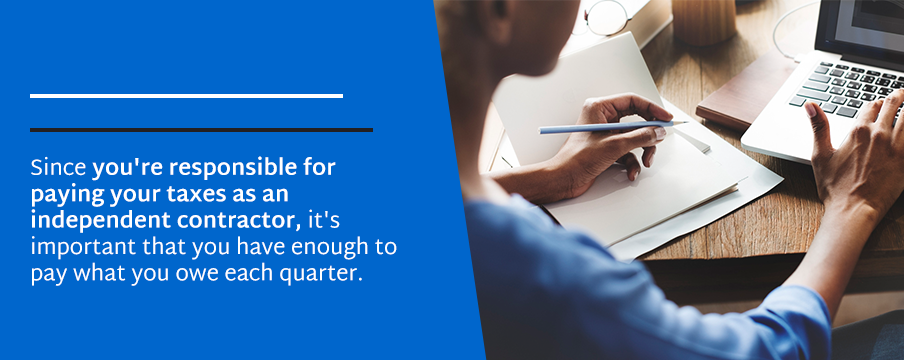
To be on the safe side, pay yourself first whenever you get a payment from a client. For example, if you estimate that you’ll need to pay about 25% of your income in tax, subtract 25% from each payment you get and put it in a separate bank account. Then, when each estimated tax due date comes along, send one-quarter of your estimated tax for the year to the IRS. Be sure to include the amount of income tax and self-employment tax you’ll owe for the year in each estimated payment.
Another option is to use the amount of tax you owed last year as a guide to estimating your tax owed this year. If you pay 100% of the tax you owed the previous year in estimated payments this year, the IRS won’t charge you any penalties, even if your income and tax is more this year. There is an exception to the rule, though. If you earn more than $150,000, you need to pay 110% of the amount you paid in tax the previous year to avoid underpayment penalties.
Business Expenses Independent Contractors Can Deduct
Although your taxes may be higher as an independent contractor compared to an employee, you also have more opportunities to deduct expenses from your income, lowering your taxable earnings and reducing the amount of tax you might owe. As of 2019, there are several categories of business expenses and tax deductions for independent contractors.
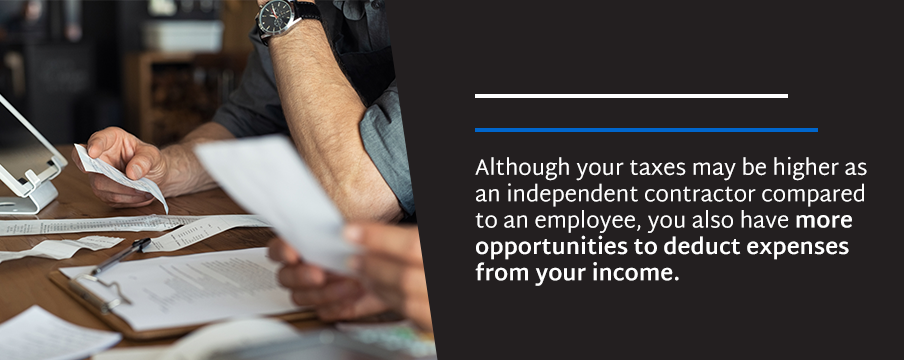
Self-Employed Health Insurance Premiums Deduction
Self-employed individuals who purchase their own health insurance coverage and who aren’t covered by an insurance plan through an employer can deduct the amount they pay in premiums from their taxable income. If you qualify for the health insurance premium deduction, you can deduct the cost of both medical and dental insurance as well as long-term care insurance. You can deduct the cost of premiums you pay for yourself, your spouse and your dependents.
You don’t need to complete a special form or itemize your deductions to claim your health insurance deduction. All you need to do is record the amount you paid during the year on Schedule 1 of Form 1040. If you can claim the deduction, it’s worth noting that you can’t subtract more than the amount you earned as a self-employed person during the year. If you had a self-employment income of $10,000 and you paid $12,000 in health insurance premiums, then the maximum amount of the deduction is $10,000.
Self-Employment Tax Deduction
One of the drawbacks of working as an independent contractor is that you need to pay double what an employee does for Medicare and Social Security tax, since you’re responsible for the employer and the employee portion of the tax.
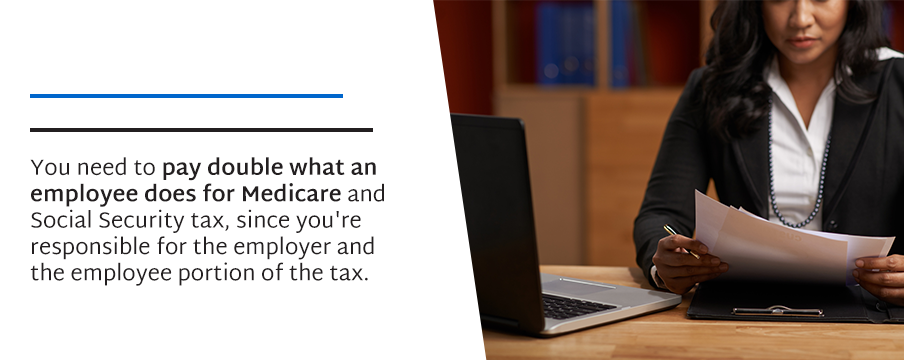
To help reduce the sting of paying 15.3% in self-employment tax, the IRS lets you deduct the employer portion of the tax from your income. If your self-employment tax for the year is $9,000, you can subtract $4,500 from your taxable income. You can claim the deduction on Schedule 1 of Form 1040.
Qualified Business Income Deduction
The 2017 Tax Cuts and Jobs Act created the Qualified Business Income Deduction, which lets independent contractors who are sole proprietors deduct up to 20% of their qualified business income (QBI). Your QBI is the net amount of income you received from your business during the year. You can claim the deduction if your income is less than $160,700 in 2019 if you’re single. The amount is doubled for married couples who file a joint return.
Independent contractors who earn above the income limit might still qualify for the QBI deduction, based on the type of work they do. Usually, the deduction is phased out for high-earners who work in fields such as healthcare, law and the performing arts. Understanding whether you qualify for the QBI deduction or not can be tricky. If you’re not sure about it, your best bet is to talk to a tax professional before you file your return.
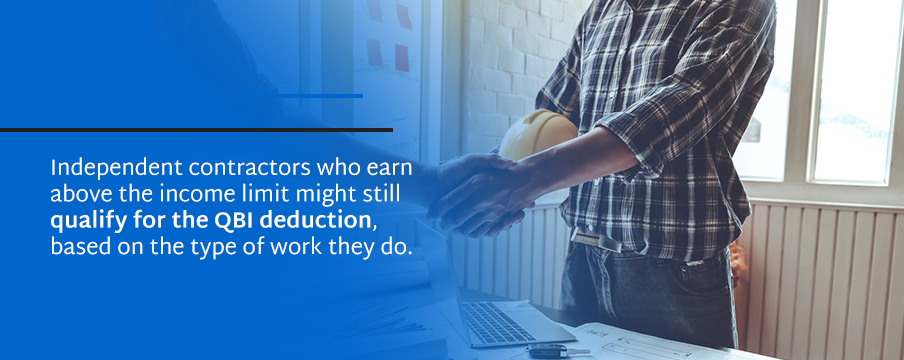
Deductions for Ordinary and Necessary Business Expenses
You can most likely deduct the cost of anything that is necessary for you to run your business successfully. The IRS lets independent contractors deduct what it calls “ordinary and necessary” business expenses. “Ordinary” means the expense is common in your business or trade, such as the cost of owning a truck if you’re a construction contractor. “Necessary” means an expense that’s helpful or appropriate for your business, such as the cost of advertising to get new clients.
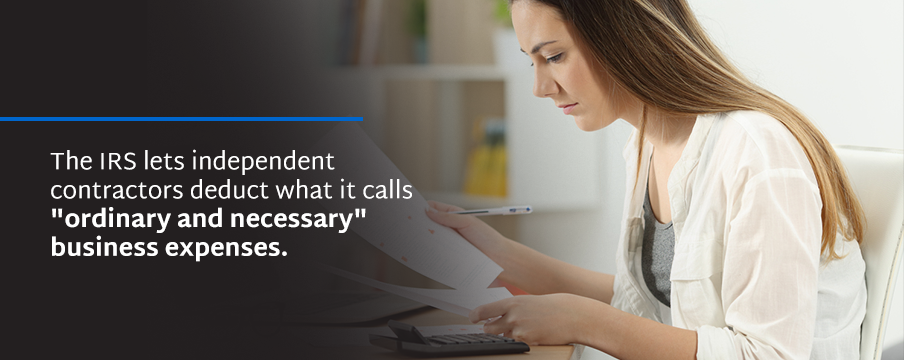
Some of the expenses you might be able to deduct from your income when you file your tax return include:
- Marketing or advertising fees: If you advertise in a local newspaper, pay to have a website or work with a marketing agency, you can deduct the cost from your income.
- Mileage: If you use a car or truck for your business, you can either claim the standard mileage deduction or calculate the cost of gas, maintenance and registration and deduct it. If you need to use public transit to get to clients, then you can deduct the cost of your bus or train fares, too.
- Rent: The cost to rent an office, car, truck or other equipment is deductible.
- Wages paid to employees: If you happen to employ people, such as carpenters or other construction workers, you can subtract the wages you pay them from your income.
- Payments to contractors: You can also subtract any payments you make to vendors or contractors from your income.
- Office expenses: Along with deducting what you pay in rent for an office space, you can also deduct any expenses related to the upkeep of the office, such as the purchase of pens and other office supplies and the cost of hiring a cleaning service.
- Postage: If you have to send anything in the mail or ship packages, you can deduct what you pay in postage.
- Meals: If you take a client out to a meal to discuss a business matter, you can deduct 50% of the cost of the meal from your income.
- Professional service fees: If you hire a CFO firm, accountant, lawyer or another professional, you can deduct their fees from your income.
- Interest: You’re able to deduct interest payments you make on a loan, provided that the loan has to do with your business. For example, you can deduct credit card interest from a business credit card or the interest on an auto loan you got for your business.
- Insurance premiums: If you have any business insurance premiums, you can deduct them.
- Supplies: If you purchase supplies for your business, such as nails, paint and lumber, you can most likely deduct the cost.
Deduction for Business Use of Your Home
If you use part of your home as your primary place of business, you might be able to claim a deduction for business use of your home. To qualify for the deduction, the area of your home needs to be exclusively used for business. You can’t call clients or look over blueprints on your dining room table and claim the deduction. But if you have a separate office for your business and you only do business-related work in it, you can most likely claim the deduction.
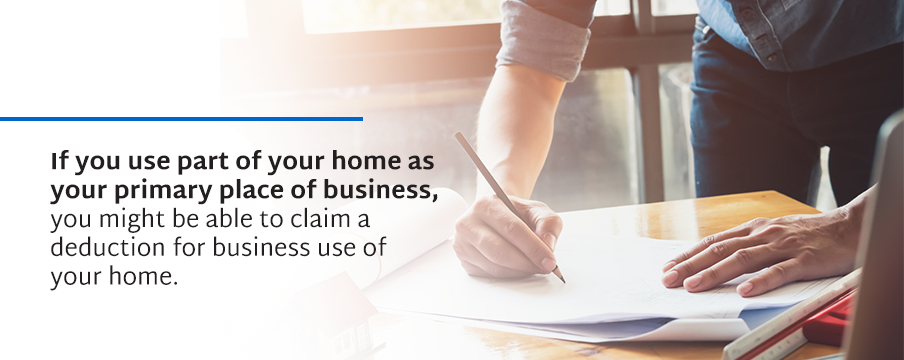
Don’t Forget About State and Local Taxes as an Independent Contractor
Unless you live in one of the few states that don’t have an income tax, you will most likely have to pay state income tax on your earnings as an independent contractor. How state taxes work varies from place to place. Some states use a progressive income tax system while others have a flat tax rate for everyone who earns income. If your state has an income tax, you’ll most likely have to make estimated tax payments throughout the year to its department of revenue to avoid an underpayment penalty.
Your city or municipality might also expect you to pay taxes on your income as an independent contractor. Depending on your location, you might pay the same amount as people who earn a salary pay, or your city or municipality might charge you a business tax rate. Check with your local government to make sure you have all the licenses you need and to make sure that you’re paying the right tax at the right time.
Tax Forms for Independent Contractors
When it comes time to file your federal taxes, you can expect to fill out a bit more paperwork than the average salary or hourly employee. Although you can complete an individual tax return as an independent contractor, you need to complete additional schedules. Some of the forms you can expect to fill out include:
- Form 1040: Like everyone else, you need to complete Form 1040 when you file your tax return. You list your contact information, dependent information, income amounts and adjustments to income on form 1040.
- Schedule 1: On Schedule 1, you list any additional income, such as rental property income or farm income, as well as certain deductions or adjustments to your income. You record the deductible part of self-employment tax and your health insurance premium deduction on Schedule 1.
- Schedule C or C-EZ: Schedule C or C-EZ is the form independent contractors use to report their business income as well as to deduct their “ordinary and necessary” business expenses. If you have expenses of less than $5,000, you can use C-EZ and skip itemizing. If your expenses are more than $5,000, you need to itemize them on the full Schedule C.
- Schedule SE: If your self-employment income is more than $400, you need to use Schedule SE to calculate it.
- Form 8829: If you’re going to claim the home office deduction, you’ll need to complete Form 8829 to calculate the amount you can deduct.
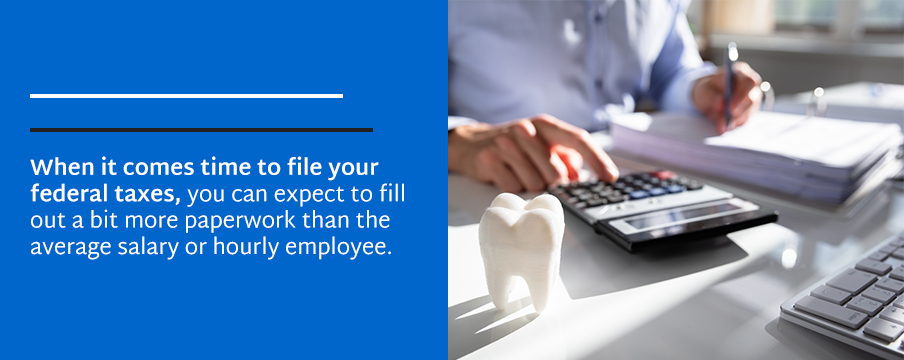
Along with filling out different forms when it’s time to file your tax return, you’re likely to receive different tax forms from the companies you worked with during the year. While employees receive a W-2 from each of their employers at the end of the year, independent contractors typically receive a Form 1099-MISC from their clients. The 1099-MISC reports the amount each client paid you during the year. Depending on the number of clients you had over a year, you might get a stack of 1099s in the mail or just one or two.
Technically, clients only need to send you a 1099-MISC if they paid you more than $600 in one year. If they didn’t pay that much, they might not send the form. If that’s the case, you still need to report that income. It’s a good idea to keep track of what you earned over the year so that your reported income is as accurate as possible.
When you start working with a new client, they will most likely ask you to fill out a W-9 with your contact and tax information, rather than a W-4. Since clients aren’t withholding your taxes for you, they don’t need to know about your dependents or allowances.
Streamline Your Accounting
Getting your accounting ducks in a row can help you immensely when it comes time to file your taxes. Knowing how much your construction or real estate business brought in and what your expenses are can help you as you prepare to file your return. Pasaban is an expert accounting firm who helps individuals in the real estate industry with their accounting and CFO needs.
If your organization needs expert accounting assistance, contact us today!

